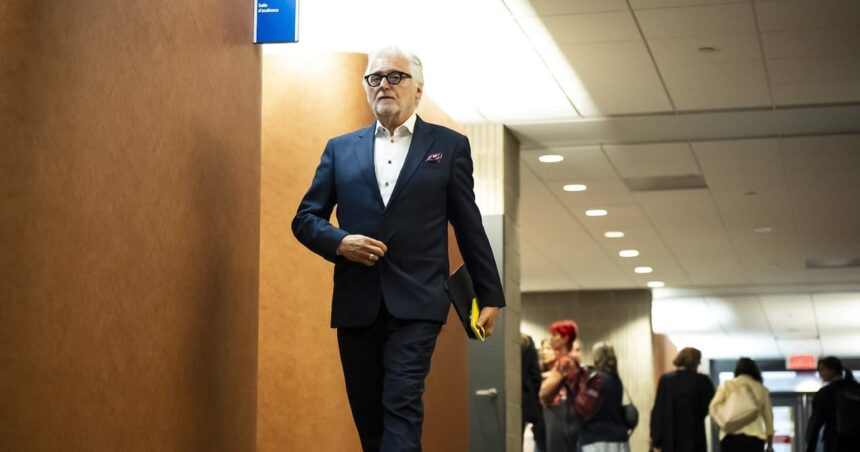The courtroom fell silent as Gilbert Rozon took the stand yesterday at the Montreal courthouse, facing questions about comments he allegedly made regarding a 1998 sexual assault case that continues to shadow the Just For Laughs founder’s legacy.
Rozon, now 70, appeared visibly uncomfortable as Crown prosecutor Marie-Claude Bourassa pressed him about statements he reportedly made to associates following his 1998 conditional discharge for sexual assault against a 19-year-old woman.
“Mr. Rozon, several witnesses have testified that you described the incident as ‘just a misunderstanding’ and ‘blown out of proportion’ at company functions between 2000 and 2005. Did you make these statements?” Bourassa asked.
The festival mogul, dressed in a charcoal suit and blue tie, shifted in his seat before responding. “I’ve always respected the court’s decision and my legal obligations. I don’t recall making those specific comments.”
I reviewed court transcripts from the original 1998 case, which show Rozon admitted to “forceful touching” of the victim at a party but maintained the encounter was consensual. The conditional discharge allowed him to avoid jail time while completing community service hours.
Legal experts observing the proceedings note the significance of revisiting these comments now. “The court is essentially examining whether Rozon violated the spirit of his conditional discharge by potentially minimizing the seriousness of his actions,” explained Dominique Bernier, a criminal defense attorney with the Association des juristes progressistes.
The questioning comes amid a broader civil case against Rozon filed by Les Courageuses, a group of women alleging a pattern of misconduct spanning decades. While the Quebec Court of Appeal previously rejected their request for class-action status, individual cases continue to move forward.
Marie-Ève Normandin of the Quebec Coalition of Sexual Assault Centers attended yesterday’s proceedings. “This questioning is important because it examines whether powerful figures truly accept responsibility or merely perform remorse publicly while privately maintaining their innocence,” she told me outside the courtroom.
Court documents obtained through access to information requests reveal that at least three former employees provided sworn statements indicating Rozon made dismissive comments about the 1998 case during private company meetings between 1999 and 2004.
The festival’s current management team has worked to distance the organization from its founder. “Just For Laughs operates independently from Mr. Rozon and has implemented comprehensive anti-harassment policies,” said communications director Yasmine Abdelfadel in a written statement.
During cross-examination, Rozon’s attorney, François Doré, argued that the alleged comments occurred over two decades ago and fall outside the scope of current proceedings. “My client has maintained a lawful life since 1998 and fulfilled all obligations placed upon him by the court,” Doré emphasized.
Judge Marie-Claire Lefebvre appeared unconvinced by this line of argument. “The court needs to understand whether there was genuine acceptance of responsibility or merely public compliance while privately maintaining a different stance,” she noted.
Quebec’s victim advocacy groups have closely monitored the case. “When conditional discharges are granted, there’s an underlying assumption that the individual acknowledges the harm caused,” explained Mélanie Lemay, co-founder of Quebec Contre les Violences Sexuelles. “If that acknowledgment was insincere, it raises serious questions about our justice system’s effectiveness.”
The proceedings continue next week when two additional witnesses are expected to testify regarding Rozon’s alleged comments. Court observers note this case highlights ongoing tensions in how the Canadian justice system handles sexual assault cases involving powerful figures.
As I watched Rozon leave the courtroom, flanked by his legal team, his expression remained stoic. The legacy of a man who built an international comedy empire now hangs in the balance of how seriously he took his own conviction decades ago.
For the dozens of observers in the gallery, many connected to the #MeToo movement that eventually led to Rozon’s resignation from Just For Laughs in 2017, this examination represents more than just legal proceedings—it symbolizes a reckoning with how society treats sexual assault admissions from those in positions of power.






